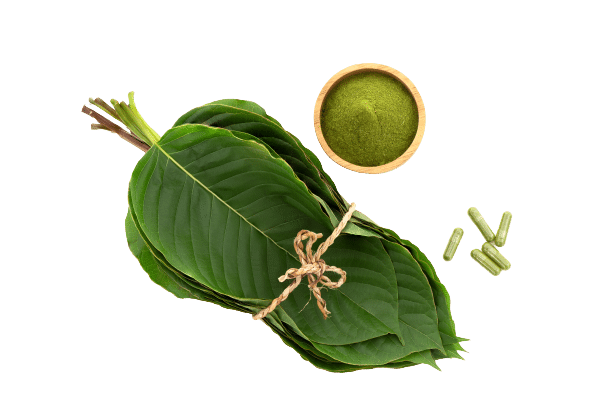Kratom is a relative of the coffee plant and has been used medicinally in Southeast Asia for centuries, growing natively in Indonesia, Thailand, and Malaysia.
In low doses, the effects of kratom closely parallel the effects of coffee. In higher doses, the effects become more sedative, analgesic, and mildly psychoactive.
This psychoactive nature is the main reason why the plant is illegal in the United Kingdom.
As of 2016, possession, sale, or import of kratom into the UK is banned.
Kratom Legality In the UK and Elsewhere
Kratom was legal in the UK for import, sale, possession, distribution, and consumption up until 2016. In that year, the newly elected conservative government decided to reevaluate various “legal highs” and proceeded to issue a blanket ban on kratom and other similar substances.
As it stands now, the UK has joined the likes of Australia, Denmark, Romania, and Sweden in the prohibition of kratom. It remains legal in the USA and Canada, but health organizations are largely against the use of kratom because of the known side effects.
Amongst the countries where kratom grows natively, the legality is mixed.
Thailand was one of the first countries to ban planting kratom through a special law passed in 1943. In 1979, the government further banned the sale and use of kratom from gaining control of the lucrative opium market.
Kratom use was becoming common as people were looking for cheaper alternatives to opium for pain management and recreational use. However, Thailand repealed the law in 2018 and made kratom fully legal.
Kratom remains banned in Malaysia, but its use is widespread because the tree grows natively. Special groups are lobbying for stricter control of kratom in the country. Indonesia has scheduled to ban the plant in 2024. This decision was taken in 2019, but it was pushed back to give kratom farmers time to switch to other crops.
As it stands now, if Indonesia truly puts the ban into effect, the global supply of kratom will take a major hit. Almost all the kratom sold anywhere in the world can be traced back to farms in Bali, Sumatra, and a few other places in Indonesia.
Can I Buy Kratom In the UK?
There are no legal sources to buy kratom in the UK.
Although kratom is illegal for sale, there are always illicit traders who are willing to source and sell kratom of dubious origin.
These are best avoided because the buyer has no way of knowing what they are getting.
Many black market online sellers adulterate kratom powder with stronger opiates or other substances — many of which can be dangerous or addictive.
The only way to try kratom legally if you’re a UK resident is to visit a nearby country where kratom is legal — such as Germany, Spain, or France.

Why Is Kratom Banned In The UK (& Other Countries)?
The reasons for banning kratom are complex.
Most of it stems from precautionary measures taken in the name of public safety. Due to a lack of definitive lab-tested evidence in favor of the plant, individual cases of overdose and adverse side-effects are used as the basis of arguments against the plant.
There are also possible undercurrents of protecting pharmaceutical interests by banning medicinal plants such as kratom.
Kratom’s efficacy has been vetted through innumerable first-hand accounts, and it’s mainly used for its therapeutic properties. Legalizing kratom potentially means lost business for manufacturers of opioids and other drugs that kratom effectively replaces.
The resulting loss in revenue is enough motivation for serious lobbying against such cheap and natural remedies that cannot be patented and sold at high-profit margins.
Known Side Effects Of Kratom
Kratom side effects are rare in moderate users. However, overdosing and mixing kratom with other substances can lead to severe complications.
The most common known side effects of kratom are as follows:
- Gastrointestinal issues causing nausea and vomiting
- Lethargy and sedation (although this may be desirable for those trying to treat insomnia)
- Dizziness
- Anxiety
- Liver functions can be impaired through long term abuse
- Liver issues can cause secondary problems with the kidneys
- Change in hormone profiles of the body
Overdosing on kratom can also produce jaundice-like symptoms because it affects the liver and causes bilirubin levels to rise.
Some individuals can become addicted to kratom, and in these cases, the potential for abuse is high. Several studies have noted the signs of kratom addiction in long-term native users. The most obvious signs include blackening of the skin, especially around the cheeks.
However, the onset of addiction is far slower than opioids such as heroin and does not carry the same fatal consequences.
Kratom Use: A Quick History
Kratom started to become popular in the West in the early 1900s as viable alternatives to opioid-based painkillers. Opioids are a highly addictive class of drugs commonly used to treat pain. They target opioid receptors to block pain signals and can induce a state of relaxation or euphoria.
What makes opioids so dangerous is how quickly tolerance develops to the compound, and its addictive nature. Used in high doses, opioids can cause respiratory failure. Kratom has both opioid-like and stimulating properties but does not have the same risks for respiratory failure.
The opioid epidemic thus plays a significant role in the rise of interest in kratom.
Researchers are studying this relationship, and initial results show that this plant-based supplement may have a lot of medicinal value. Traditionally, kratom is used to treat various health issues, including diarrhea, insomnia, and fever.
Kratom’s active compounds are alkaloids that work through the same receptors as opioids. This has made it a popular treatment for opioid addiction. It is also popular as a non-pharmaceutical alternative for pain management.
Countries like Indonesia, Thailand, and Malaysia have been using kratom for centuries and perhaps millennia. The plant grows in abundance in these countries, and its use is looked upon favorably — it’s often used in social and religious ceremonies.
Kratom (also called ketum in some regions) is historically associated with farmers and manual workers, who used it to combat fatigue, reduce pain, and increase productivity. Due to the associations with manual labor, kratom users did not face the same stigma as opium and cannabis users. The latter group was perceived as lazy and unproductive in comparison.
As the story of its use and effects reached the United States and Europe, demand for it soared overnight. In the decades that followed, kratom was studied by various research groups and scientists looking to understand its potential therapeutic effects and side effects.

Kratom Deaths: Can Kratom be Fatal?
The short answer is that kratom itself does not have lethal effects when used responsibly.
However, through various interactions with other substances (such as opioids) and preexisting health conditions, it can cause adverse reactions that might result in death.
Multiple studies have documented cases where mitragynine, the active alkaloid found in kratom, was found to be present in the body in unnatural deaths. In all cases, kratom use was simultaneous with the use of other substances.
Some researchers have suggested rigorous scientific studies to determine the potential medicinal use of kratom and its active compounds. The trajectory of the plant is, in fact, similar to the recent history of criminalization and subsequent decriminalization of the cannabis plant.
What Is The Correct Dosage For Kratom?
Most new users are recommended to start with a low dose of fewer than two grams in a 24 hour period. Anything less than 1 gram is considered a microdose.
Kratom dosage also varies according to the individual physiology of the user, including body mass and pre-existing health issues.
Starting low and slow is the best way to go for inexperienced users. It’s advisable for new users or those who are returning to kratom after a long hiatus to observe kratom’s effects over a period of several weeks before deciding to increase the dosage.
How To Take Kratom Safely
Kratom can be taken in capsules, the powder can be brewed into a tea (the traditional approach), or it can be taken via a specially made kratom tincture (the modern approach).
Kratom is best taken on its own and without mixing with any other substance, including alcohol. Even tobacco is best avoided when taking kratom. This is mainly to determine how your body reacts to kratom before you mix it with other substances.
Never mix kratom with any other medication as it has been shown to have life-threatening drug interactions with certain painkillers.
In all cases, it is very important to source your kratom from a trusted online seller with a verifiable reputation. Millions of users have shared their experiences with kratom and its sellers on various online platforms.

Key Takeaways: Is Kratom Legal In The UK?
Kratom is banned in the UK.
It cannot be imported, distributed, or sold without breaking the law. This ban is relatively recent, and thus there is a possibility of it being reversed in the future, such as what happened in the case of Thailand.
UK users are best off going to a place where kratom is legal if they want to use it. Certain groups are lobbying for the decriminalization of plants such as kratom, and the development of kratom in the UK should be observed with interest.
